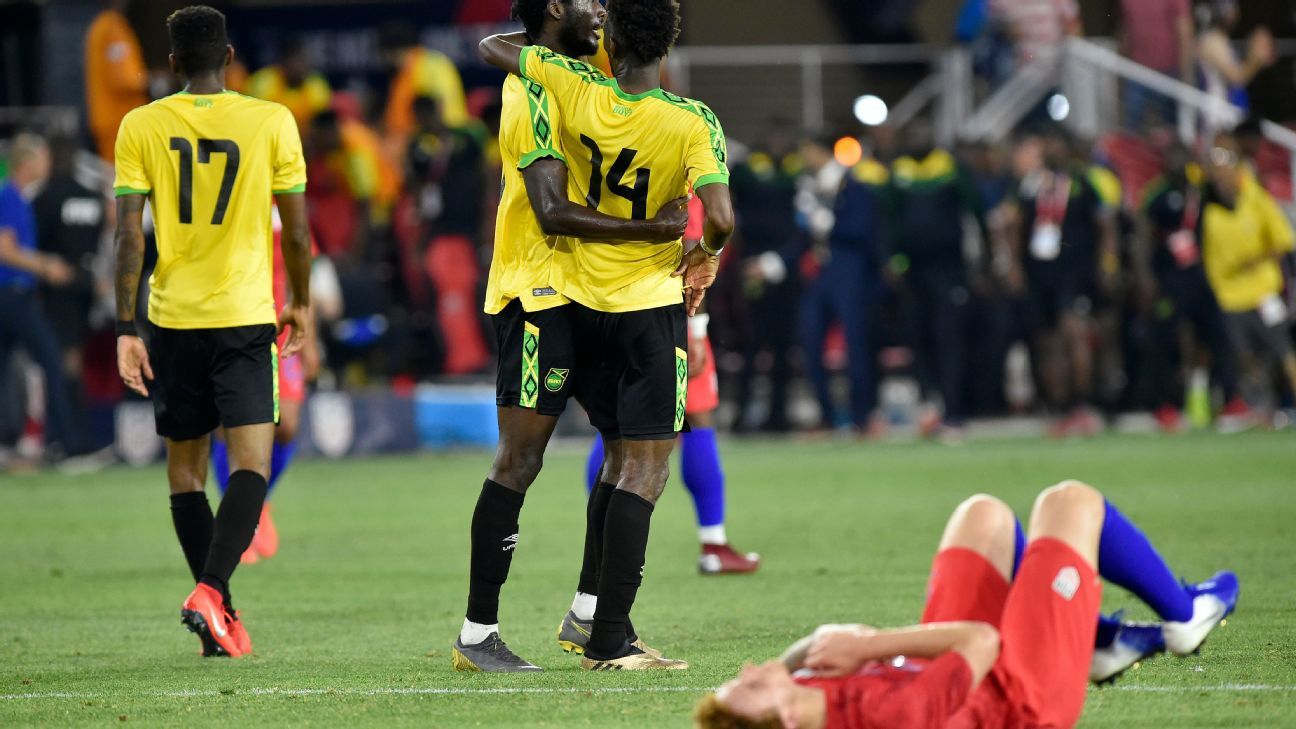
WASHINGTON -- U.S. men's national team manager Gregg Berhalter said his side's 1-0 friendly defeat to Jamaica was "really something to learn from" though he admitted that "we performed poorly tonight."
Jamaica was full value for its victory, with Shamar Nicholson scoring the game's only goal in the 60th minute following a U.S. turnover in its own defensive third. U.S. forward Joshua Sargent had a late chance to equalize, but his effort was saved by Jamaica keeper Andre Blake.
"What I would say is that the guys tried," he said. "We gave a decent effort. We didn't play well, and you're going to have nights when you don't play well."
U.S. player ratings: Steffen 4/10 for Berhalter's hodgepodge group
- When is the CONCACAF Gold Cup?
- Full Gold Cup fixtures schedule
With most of the roster having just arrived into camp last weekend, the U.S. was playing without much of its first-choice lineup. That reality was exacerbated by the fact that LA Galaxy midfielder Sebastian Lletget has been ruled out of the Gold Cup with a hamstring injury. So Berhalter also trotted out what he called a 3-4-2-1 formation, one that saw Cristian Roldan and Djordje Mihailovic play as attacking midfielders in support of lone striker Sargent.
But even with those factors, this was a performance to forget for the Americans. The first 20 minutes started brightly enough, with the U.S. getting behind the Jamaican defense on several occasions. The Reggae Boyz soon tightened up their defense and began to find some chances on the counter. With Jamaica ratcheting up its defensive pressure in the second half, the U.S. struggled, and the visitors soon got the goal it needed through Nicholson.
The night's action left Berhalter defending his choice of formation and personnel. The U.S. manager wanted to make sure he had an alternative alignment that was familiar to his players when the Gold Cup arrives.
"One of the objectives of this first camp was to play an alternate formation, so we achieved that," he said. "I think there's tweaks we can make to that formation better, make it function better. But overall, that was positive. The negative was that we lacked speed. We lacked aggression in the final third. When you talk about when the ball is wide, there should be four guys in the penalty box, and we only had two most of the time. Even when we won the ball in good positions, now it's time to counter, now it's time to really force ourselves on the opponent. We didn't do that."
Berhalter also said that the fact that the U.S. will name its final 23-man Gold Cup roster later tonight had a negative effect on some players.
"The roster was pretty much intact from our point of view," he said. "But when there's a deadline, when you're naming a roster, it weighs on people. I think we saw some of that. I don't think any of those guys will make excuses. I'm not going to make excuses. We know we need to improve. We know we need to get better. We know we need to be I think more aggressive in the final third. We had one shot on goal today. That's pretty poor, and we know that."
The fact that Berhalter had so little of his first-choice lineup wasn't a deterrent, especially with the experience he had at his disposal in the back.
"It's guys that are full internationals, you're talking about Tim Ream, Matt Miazga and Omar [Gonzalez]. With them in particular we wanted to see how that would work with the center-backs. When you throw a guy like Antonee Robinson, who has that ability I think to be a wing-back with his speed and his aggression and his crossing ability, we had enough pieces in the camp the week before to give it a try."
The result will do little to placate a fanbase whose emotions are still raw form the failure to qualify for the last World Cup. But Berhalter is undaunted.
"I'm not sure it should be that volatile that you turn against a team after one poor performance," he said. "There's going to be more, especially as time goes on, there will be more poor performances when I'm coach. I guarantee it. That's part of it. Are the guys bought in? Are they working hard? Are we executing the kind of soccer we're trying to execute? We're getting there."















 Phone: (800) 737. 6040
Phone: (800) 737. 6040 Fax: (800) 825 5558
Fax: (800) 825 5558 Website:
Website:  Email:
Email: 






